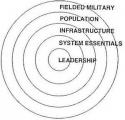Hi,
I am working on a project looking at the recent evolution of the U.S. armed forces interest and capabilities in IW/COIN/StabOps and what implications it may carry for Finland, EU and NATO. Open disclosure: the project is mainly funded by the Defence Ministry and any report is meant for public dissemination.
The first portion, what has taken place, the debates, most recent budget request etc. I feel I have under fairly good control (thanks in part to SWJ & SWC). Interviews and thinking (hey, I'm being paid for something, right?) have clarified some of the potential implications but, I would greatly appreciate any insights (personal, links to reports etc.) anyone of the boards has on what the concrete consequences of the increased focus on IW/COIN/Stabops may have on (1) NATO, EU and Finland, and (2) the future of the concepts 'crisis management' (EU) and 'peacebuilding/keeping' (UN).
I don't want to guide any potential replies at this point, but look forward to engaging in a discussion and sharing my insights as they are at the moment.
Thank you in advance.






 ) as to what age-old and modern tactical capabilities are really necessary - on the ground and looking at it from the air - particularly for a smaller nation.
) as to what age-old and modern tactical capabilities are really necessary - on the ground and looking at it from the air - particularly for a smaller nation.



Bookmarks